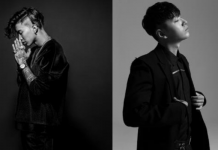Winner’s Song Min-ho is back on the news with more controversy for his “misogynistic” lyrics.

On Oct 23, Epik High released their 9th album, ‘We’ve Done Something Wonderful’. Winner’s Song Min-ho wrote lyrics to one of the tracks, ‘No Thank You’.
In ‘No Thank You’, part of the lyrics goes: “”Even using the word motherfucker is being called misogynistic [or hate], shit.” Listeners claimed that the line was misogynistic.
[Note: In the original Korean lyrics, 혐오=’hate’ was used, but 여성혐오=’misogyny’ is implied]
Epik High’s Tablo addressed the controversy involving Song Min Ho’s lyrics, saying there were “absolutely no misogynistic intentions.” According to the rapper, “’No Thank You’ aims to satirize the social tendency to thoughtlessly judge things based on personal standards.”
In essence, he argues that the lyrics are not misogynistic because their intended meaning is not about hating on women.
Unfortunately, the intended meaning does not matter when determining whether or not words or actions are misogynistic.
However, it is worth asking whether the word ‘misogyny’ can be applied to the lyrics in ‘No Thank You’. I would argue that based on the use of stereotypical images of women rather than expressions of hatred or violence towards them, Song Min-ho’s lyrics are sexist, not misogynistic. (Read about the difference between sexism and misogyny here.)
Analysis of the Word “Motherf*cker”
“Motherfucker” as a word is inherently sexist. It portrays and has roots in a patriarchal system where women are seen and treated differently—as passive, lower beings. The word itself implies that one who “fucks” someone’s mother is inhuman, and relies on the notion that women are sexual things/objects that are to “be fucked”.
The word threatens the mother’s (woman’s) sexual integrity and puts the man in a position of power. (Note that there is no male equivalent to the word, like “fatherfucker”.) The “motherfucker” is a male, and the agent.
Nowadays, the word is usually used as an intensifier (Kesha belting out “I’m a motherfucking woman”), a compliment (“I’m a bad motherfucker”), to describe a despicable person (“I’m going to kill that motherfucker”), and as a casual greeting (“Hey what’s up motherfucker”).


With today’s popular culture normalizing words like “motherfucker” and “bitch”, it is easy to ignore their sexist undertones. Furthermore, “motherfucker” is easily dismissed because it is commonly used by men to address other men, especially in hip-hop music.
However, using the word casually and because “everyone says it” does not make the word “non-sexist”. It does not change its sexist origins where women are the ones that “get fucked” and even have to pay the price for it.

The logic that the word is “non-sexist” because men use it to address other men, not women, is also heavily flawed. Regardless of the identity of the user and receiver, the word relies on the image of a woman with no agency to give the user a sense of ‘toughness’ or masculinity. Through this, they are directly contributing to a centuries-old oppressed view of women.
Sexist language is the foundation for sexist and misogynistic behaviors.
Language matters.
Sexist Themes in ‘No Thank You’
You can act like you’re a big guy but you can’t digest
It’s not easy, the stage is about your rashness
Check it motherfuckers, my lyrics
Even using the word motherfucker is being called misogynistic, shit
But I’m not your boss, I’m not your teacher
So if you start critiquing someone, it bothers me
If you’re curious about my private life
You be my mother, punk- ok?
I only care about my life and death
Even if I get shit on, I don’t get embarrassed
“A CEO who doesn’t go to work”
“A rapper who doesn’t hustle”
But why are all the girls who bathe in my foam so pretty?
– Lyrics from ‘No Thank You’
‘No Thank You’ portrays a ‘tough guy’ trying to reclaim his identity by living for himself and “not giving a fuck” about others’ perceptions of him. However, Song Min-ho’s tough guy reclaims himself by reinforcing a system that supports stereotypical images of women.
The line, “Even using the word motherfucker is being called misogynistic [or hate], shit” implies that “motherfucker” is not misogynistic or hateful and that people should not take it so seriously.
However, Song cannot be the one to decide what the word is or isn’t because the word is not his; the word historically belongs to men who oppressed women and their sexuality. Therefore, “motherfucker” has and always will be a word that undermines women.
The part, “If you’re curious about my private life, you be my mother, punk-ok” implies that mothers, not fathers, are the ones who probe into their child’s private lives. (Why don’t songs ever portray fathers as having interest in their child’s life?)
The last line, “But why are all the girls who bathe in my foam so pretty” also portrays women as accessories, whose value comes from looking “pretty”. (Note that the word ‘girl’ is appears instead of ‘women’.)
“That’s Not What We Intended”: Intent vs. Impact

Although the song does not intend to demean women, it inevitably does, because it relies on sexist words and the submissive image of women to relay its message. In addition, the song does not use those words or images to make a greater, meaningful statement about sexism or misogyny.
Therefore, Tablo’s “that’s not what we intended” argument ends up falling short and sounding like an excuse; it comes off as saying “so deal with it” to women who continue to face fear and oppression in every part of society.
In that case, the listeners’ negative reactions to the lyrics start making a lot sense.
Of course, Song Min-ho is not the only one to promote limited portrayals of women. It is even questionable whether Song is aware of his own tendency to internalize sexist attitudes.
Should the public bash and label him as a sexist or misogynist? No.
But it is worth letting artists know and holding them accountable for their work, especially when they hold the power to influence many.
By Janet Kang





![[TEASER] Taeyeon Releases Video Teaser for Her Single ‘Four Seasons’](https://kpoplove.koreadaily.com/wp-content/uploads/2019/03/maxresdefault-14-218x150.jpg)
![[M/V] Baek Yerin Ends 2-Year Hiatus with ‘Maybe It’s Not Our Fault’](https://kpoplove.koreadaily.com/wp-content/uploads/2019/03/sddefault-2-218x150.jpg)
![[M/V] Red Velvet Yeri Releases New Song ‘Dear Diary’ on SM Station](https://kpoplove.koreadaily.com/wp-content/uploads/2019/03/maxresdefault-13-218x150.jpg)
![[HOT CLIP] Park Bom Performs ‘Spring’ Live for the First Time at Showcase](https://kpoplove.koreadaily.com/wp-content/uploads/2019/03/maxresdefault-12-218x150.jpg)




